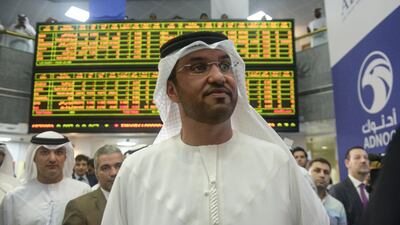Abu Dhabi National Oil Company will announce its downstream strategy "soon" as it plans to double refining capacity, triple petrochemical output , and look at new capital structures, its chief executive said on Tuesday.
"While we appreciate the impact of our operations on the upstream, we have clearly indicated that Adnoc has to go downstream in order for us to be able to unlock value," Dr Sultan Al Jaber, UAE minister of state and Adnoc group chief executive said on a panel in Abu Dhabi.
"There are some new creative capital structures ideas also that we are going to be introducing very soon."
Adnoc, which spun off its retail and distribution unit in December in an initial public offering in Abu Dhabi, is working with the capital's financial community on "more opportunities", Dr Al Jaber said in response to a question on possible IPOs in the pipeline this year. He declined to be more specific on the group's plans.
On Sunday, Adnoc Distribution, the UAE's biggest fuel distributor and convenience store operator, announced a 6.8 per cent increase year-on-year in fourth-quarter profit, on the back of higher oil prices and an increase in fuel sales.
The UAE, the second-largest oil producer in the Gulf behind Saudi Arabia, in November announced a spending commitment of Dh400 billion over the next five years. It plans to invest more than 40 per cent of the capex to diversify and grow its downstream businesses as part of a strategy to triple petrochemical production by 2025. Dr Al Jaber didn't give a timeline for doubling refining capacity.
Earlier in February, Adnoc said it would invest $3.1bn in upgrading its Ruwais refinery to provide more flexibility to process crude grades other than its flagship Murban as it looks to free up more fuel for export.
_______________
Read more:
Adnoc awards $850m concession agreements to Japan's Inpex
Adnoc awards Indian firm Dh1.25bn contract to develop onshore field
_______________
Along with developments in upstream and downstream, Abu Dhabi's oil major will look to enhance its in-country value (ICV) strategy, announced a few weeks ago.
"We will engage more with the financial sector, with the financial community and one of the things that we will evaluate will be the ICV. Have they taken ADGM [Abu Dhabi Global Market] as their premier destination, decided to locate physically, because we do care about ICV," said Dr Al Jaber.
"We are actually going to measure it against the very set and clear criteria by the SPC [Supreme Petroleum Council] and Adnoc in helping to advance the local economy."
Gulf oil companies such as Saudi Aramco and Petroleum Development Oman have pushed for higher local content generation among contractors across their value chain. Aramco is currently pursuing a local content strategy that aims to double the percentage of goods and services locally-produced for the energy sector to 70 per cent by 2021.
Abu Dhabi's state oil firm is currently in the middle of splitting its offshore entity Adma-Opco into three concession groups to be operated in partnership with international oil and gas companies, with Adnoc retaining a 60 per cent stake.
On Monday, Adnoc awarded Japan's Inpex operating stakes in an offshore concession and extended existing partnerships on two others in a deal worth around $850 million. The existing concession agreements with Adma-Opco are set to expire on March 8.


